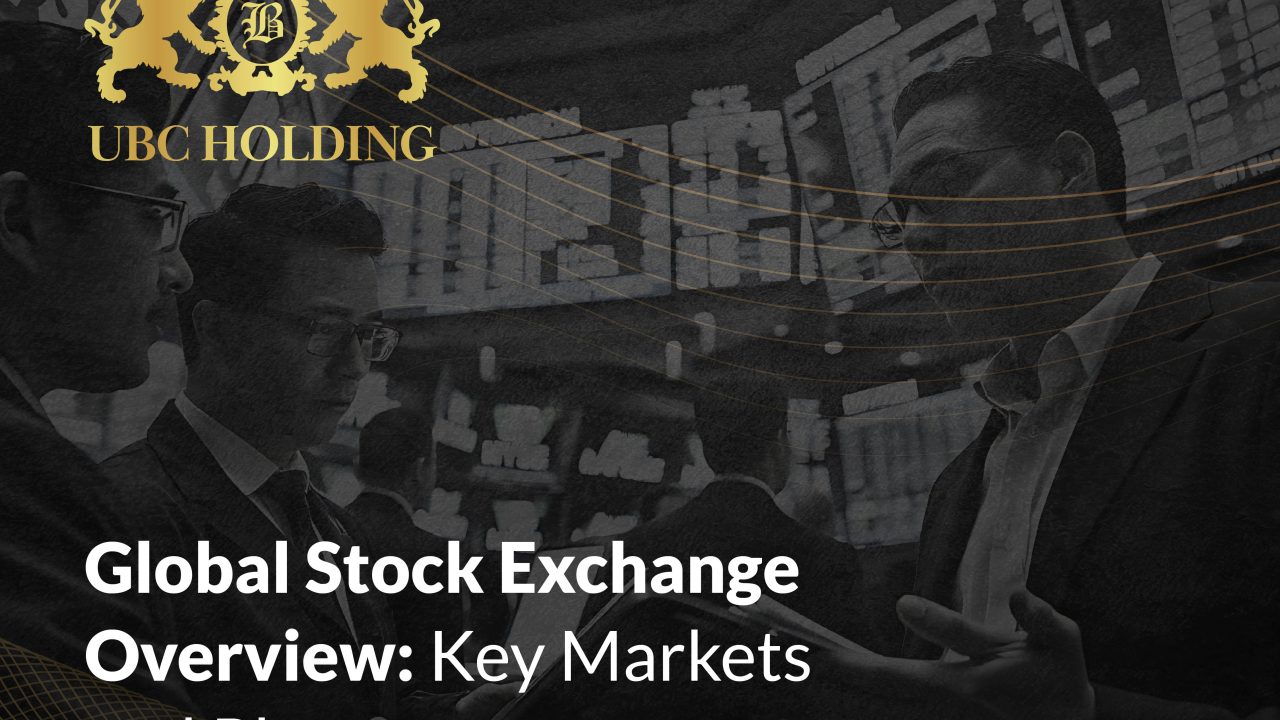The global stock exchange is a cornerstone of modern finance, acting as a barometer of economic health and a facilitator of capital formation. The “Global Stock Exchange” market is vast and intricate, involving numerous key players and markets across different continents. This article aims to provide an in-depth overview of the global stock exchange, highlighting its key markets and players. We’ll explore the intricacies of major stock exchanges, understand their impact on the global economy, and offer insights into the future trends shaping this dynamic field.
The Importance of Global Stock Exchanges
What is a Global Stock Exchange?
A global stock exchange is a centralized marketplace where securities, such as stocks and bonds, are bought and sold. These exchanges provide a platform for companies to raise capital by issuing shares to the public and for investors to buy and sell these shares, ensuring liquidity and price discovery.
Role of Global Stock Exchanges
Global stock exchanges play a crucial role in the economy by:
- Facilitating Capital Formation: Companies can raise funds for expansion and innovation by issuing stocks.
- Providing Liquidity: Investors can easily buy and sell securities, ensuring liquidity in the market.
- Enabling Price Discovery: Stock prices are determined by supply and demand dynamics, reflecting the true value of securities.
- Acting as Economic Indicators: Stock market performance often mirrors the health of the economy, with rising markets indicating growth and falling markets indicating downturns.
Major Global Stock Exchanges
New York Stock Exchange (NYSE)
The New York Stock Exchange (NYSE) is the largest stock exchange in the world by market capitalization. Located on Wall Street in New York City, the NYSE is home to many of the world’s largest and most influential companies. Key features of the NYSE include:
- Market Capitalization: The NYSE boasts a market capitalization of over $30 trillion.
- Listed Companies: It has over 2,400 listed companies, including giants like Apple, Microsoft, and ExxonMobil.
- Trading Volume: The NYSE handles a significant portion of the world’s trading volume, making it a pivotal player in the global stock exchange landscape.
NASDAQ

The NASDAQ, also based in New York City, is renowned for its technology-focused listings. It is the second-largest stock exchange globally by market capitalization. Key features of NASDAQ include:
- Technological Focus: NASDAQ is home to tech giants like Amazon, Google, and Facebook.
- Market Capitalization: It has a market capitalization of over $15 trillion.
- Innovative Trading: NASDAQ was the first electronic stock exchange, revolutionizing the way securities are traded.
Tokyo Stock Exchange (TSE)
The Tokyo Stock Exchange (TSE) is the largest stock exchange in Asia and the third-largest globally by market capitalization. Key features of the TSE include:
- Market Capitalization: The TSE has a market capitalization of over $6 trillion.
- Listed Companies: It is home to more than 3,700 listed companies, including major corporations like Toyota, Sony, and Mitsubishi.
- Trading Volume: The TSE plays a crucial role in the Asian and global stock exchange markets.
London Stock Exchange (LSE)
The London Stock Exchange (LSE) is one of the oldest and most prestigious stock exchanges in the world. Key features of the LSE include:
- Market Capitalization: The LSE has a market capitalization of over $4 trillion.
- Global Reach: It is known for its international listings and global reach.
- Trading Volume: The LSE is a key player in the European stock exchange market, influencing global financial trends.
Shanghai Stock Exchange (SSE)
The Shanghai Stock Exchange (SSE) is one of the largest stock exchanges in China and the fourth-largest globally by market capitalization. Key features of the SSE include:
- Market Capitalization: The SSE boasts a market capitalization of over $5 trillion.
- Listed Companies: It has more than 1,500 listed companies, including major Chinese corporations like PetroChina and Industrial and Commercial Bank of China (ICBC).
- Influence: The SSE plays a significant role in the Chinese and global stock exchange markets.
Key Players in the Global Stock Exchange

Institutional Investors
Institutional investors, such as mutual funds, pension funds, and hedge funds, are major players in the global stock exchange market. They manage large sums of money and have a significant influence on market trends. Key characteristics of institutional investors include:
- Market Influence: Their large-scale trades can move markets and influence stock prices.
- Investment Strategies: They employ sophisticated investment strategies, including long-term investments, short selling, and derivatives trading.
- Risk Management: Institutional investors often use advanced risk management techniques to protect their portfolios.
Retail Investors
Retail investors, or individual investors, participate in the global stock exchange market by buying and selling securities for their personal accounts. Key characteristics of retail investors include:
- Market Participation: Retail investors make up a significant portion of the trading volume, especially in emerging markets.
- Investment Strategies: They typically engage in long-term investments, day trading, and mutual fund investments.
- Technological Adoption: The rise of online trading platforms has made it easier for retail investors to participate in the stock exchange market.
High-Frequency Traders
High-frequency trading (HFT) firms use advanced algorithms and high-speed data networks to execute trades at lightning speed. Key characteristics of HFT firms include:
- Market Impact: HFT firms can execute thousands of trades in a second, contributing to market liquidity and volatility.
- Technological Edge: They rely on cutting-edge technology and data analysis to gain a competitive edge.
- Controversy: HFT has been a subject of debate, with critics arguing that it can lead to market manipulation and instability.
Market Makers
Market makers are firms or individuals that provide liquidity to the stock exchange market by buying and selling securities. Key characteristics of market makers include:
- Liquidity Provision: They ensure that there is always a buyer and seller for a security, contributing to market stability.
- Bid-Ask Spread: Market makers profit from the difference between the bid and ask prices of securities.
- Regulatory Role: They play a crucial role in maintaining orderly markets and are often regulated by stock exchanges and financial authorities.
Regulators
Regulators oversee the functioning of the global stock exchange market to ensure fairness, transparency, and investor protection. Key characteristics of regulators include:
- Regulatory Framework: They establish rules and regulations governing market conduct, trading practices, and disclosure requirements.
- Market Surveillance: Regulators monitor market activities to detect and prevent fraud, manipulation, and insider trading.
- Investor Protection: They implement measures to protect investors’ interests and maintain market integrity.
Future Trends in the Global Stock Exchange

Technological Advancements
Technological advancements will continue to shape the future of the global stock exchange market. Key trends include:
- Artificial Intelligence: AI-driven algorithms will enhance trading strategies, risk management, and market analysis.
- Blockchain Technology: Blockchain will revolutionize settlement processes, improve transparency, and reduce fraud.
- Quantum Computing: Quantum computing has the potential to solve complex trading problems and optimize investment strategies.
Sustainable Investing
Sustainable investing, which considers environmental, social, and governance (ESG) factors, is gaining momentum in the global stock exchange market. Key trends include:
- ESG Integration: Investors will increasingly integrate ESG factors into their investment decisions.
- Green Bonds: The issuance of green bonds, which finance environmentally friendly projects, will rise.
- Corporate Responsibility: Companies with strong ESG practices will attract more investors and enjoy higher stock valuations.
Globalization
Globalization will continue to influence the global stock exchange market. Key trends include:
- Cross-Border Listings: Companies will seek cross-border listings to access larger capital pools and diversify their investor base.
- Market Integration: The integration of global markets will enhance liquidity and create new investment opportunities.
- Emerging Markets: Emerging markets will play a more significant role in the global stock exchange market as their economies grow and mature.
Regulatory Changes
Regulatory changes will shape the future of the global stock exchange market. Key trends include:
- Increased Oversight: Regulators will implement stricter oversight to ensure market stability and protect investors.
- Market Reforms: Market reforms will aim to enhance transparency, reduce systemic risk, and promote fair competition.
- Global Cooperation: International cooperation among regulators will address cross-border market issues and harmonize regulatory standards.
Demographic Shifts
Demographic shifts will influence the global stock exchange market. Key trends include:
- Aging Population: An aging population in developed markets will impact investment strategies and retirement planning.
- Millennial Investors: Millennials, with their unique investment preferences, will shape market trends and drive demand for innovative financial products.
- Rising Middle Class: The rising middle class in emerging markets will increase retail participation in the stock exchange market.
Strategies for Investing in the Global Stock Exchange

Diversification
Diversification is a fundamental strategy for investing in the global stock exchange market. By spreading investments across different asset classes, sectors, and geographies, investors can reduce risk and enhance returns.
Long-Term Perspective
Taking a long-term perspective is crucial for success in the global stock exchange market. While short-term market fluctuations can be unpredictable, a long-term approach allows investors to ride out volatility and benefit from compounding returns.
Fundamental Analysis
Fundamental analysis involves evaluating a company’s financial health, industry position, and growth prospects. Investors who conduct thorough fundamental analysis can identify undervalued stocks and make informed investment decisions.
Technical Analysis
Technical analysis focuses on price patterns, trends, and market sentiment. By analyzing historical price data and using technical indicators, investors can identify potential entry and exit points for their trades.
Staying Informed
Staying informed about market trends, economic indicators, and geopolitical developments is essential for making informed investment decisions. Investors should regularly read financial news, follow market analysts, and stay updated on global events that can impact the stock exchange market.
Conclusion
The global stock exchange is a dynamic and complex marketplace, involving numerous key markets and players. Understanding the intricacies of major stock exchanges, recognizing the roles of different market participants, and staying abreast of future trends are essential for navigating this ever-evolving landscape. By employing sound investment strategies and staying informed, investors can capitalize on opportunities in the global stock exchange market and achieve their financial goals. The global stock exchange will continue to play a pivotal role in shaping the global economy, driving innovation, and facilitating wealth creation for years to come.

